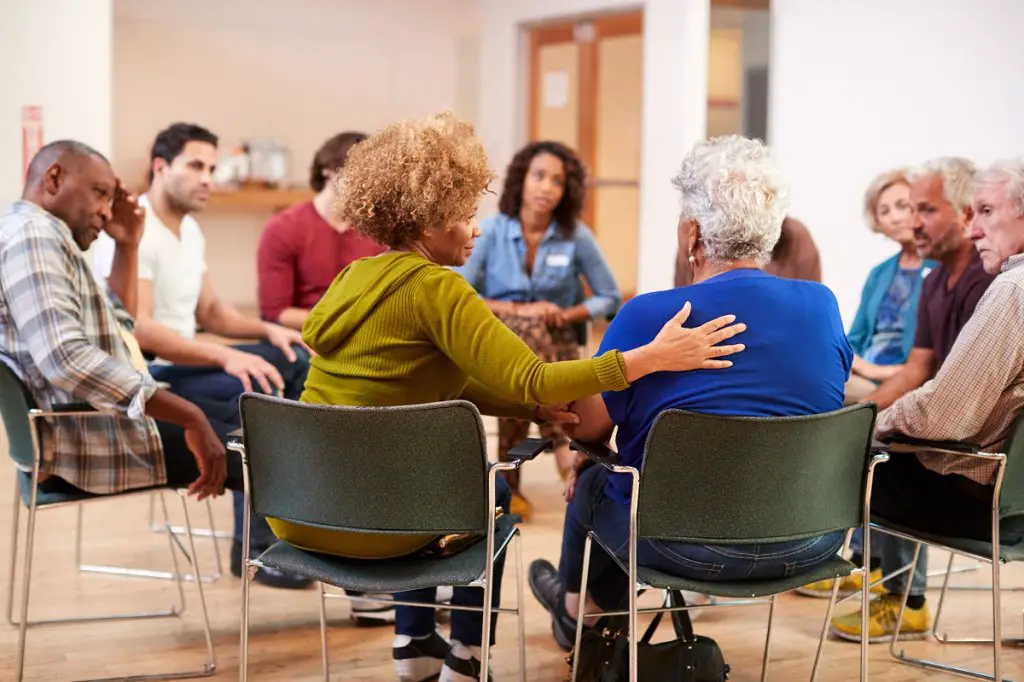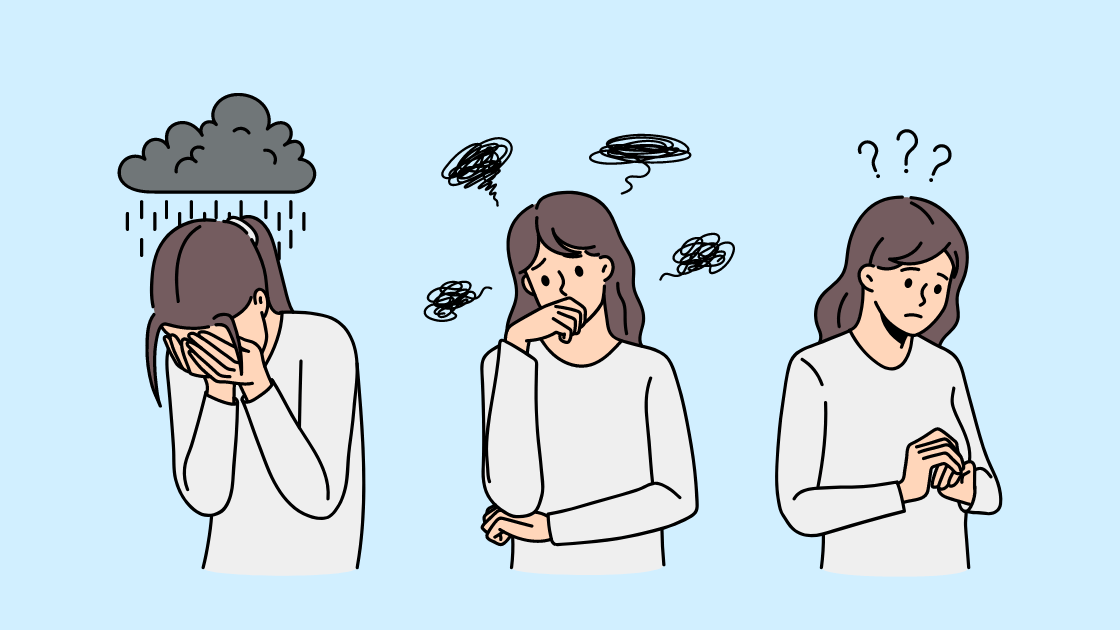Grief has no standard timeline, but many people feel fewer symptoms of grief after 6 months and feel much better after a year or two. Ongoing complicated grief can continue to affect your mind and body even after time passes, so finding ongoing bereavement support can make a difference.
Grief is a highly complex set of emotions you cannot rush through, nor can you avoid. At some point in your life, you are destined to feel grief because you can’t live an entire life devoid of relationships. Eventually, someone in our life dies, and we must work through the stages and symptoms of grief. What are the stages? Which stage is the hardest? How long does grief last? How can we help ourselves heal? All great questions.

Table of Contents
What Are The Stages Of Grief?
There are at least five, seven, or twelve stages of grief. The five most well-known stages of grief popularized by Dr. Eleizaterh Kübler-Ross are denial, anger, bargaining, depression, and acceptance. Other researchers have added more stages, but all of them link to one of these original five in some way or another. For more information on the stages of grief read The Grieving Process: Understanding The 5 Stages Of Grief.
What Is The Hardest Stage Of Grief For Most People?
As people experience grief, there are differing opinions on which stage of grief is the hardest. Some experts believe the hardest stage is depression. Not only is it the most difficult for most people to endure, but the depression stage usually lasts the longest. This is because the person is coming to grips with their loss as they work through the grieving process.
For an unexpected death, the significant loss can really rock the grieving person’s daily life. The shock of this type of loss can make that stage of grief harder for some people than others. If you know that your loved one is suffering from a terminal illness, you have some time to mentally prepare for the loss. That is not to imply that you are more “ready” to lose someone you love; rather, you don’t suffer the same type of shock as someone who does not have the same time to grieve ahead of time, which is known as anticipatory grief.
Acceptance is another stages of grief commonly identified as one of the most challenging stages by people who have gone through a significant loss. Since you must process the loss in order to accept that your loved one is gone, this stage requires you to come to terms with the loss, which is why many identify it as the most difficult stage.
Grief is not the same for everyone, so people may not go through all the steps, feel grief with the same intensity, or process through a list of steps in order.
How Long Does Grief Last As You Work Through The Stages Of Grief?
There is no timeline for working through the stages of grief. For some people, it may take a few months, and others deeply grieve for years. After a year, you might still find yourself still crying at the drop of a hat. Merely mentioning your loved one’s name or talking about the loss could bring you to tears, whereas another person will not experience that at all.
Most people agree that the first year of grief is a roller coaster of emotions as you figure out how to navigate daily life without your loved one. Whether you have lost a family member or close friend, there is no timeframe for working through the difficult time that brings about the feelings of grief.
It is also worth mentioning that even after a significant length of time, anniversaries, birthdays, and special holidays may still bring about feelings of anger, loss, or depression. There will be good days and bad days, even years after the funeral.

What Are The Physical And Emotional Signs Of Grief?
Although no two grievers are exactly alike, there are some symptoms and signs of grief that many people experience. It should also be noted that no two people grieve exactly the same and that grief changes over time for many people.
- Crying: Do you find yourself crying uncontrollably to the point that you cannot get it together to participate in daily life? While you are likely to feel emotional in the beginning, the periods of crying should lessen over time.
- Headache: Another physical symptom that can come from grief is a headache. Headaches can be made worse by lack of sleep or excessive crying or can be a standalone symptom.
- Nausea: With or without a loss of appetite, nausea is common among people who have experienced a loss.
- Loss of Appetite: Grieving people might lose weight due to a loss of appetite that accompanies grief and depression.
- Withdrawal: Grieving people sometimes withdraw or seem disinterested in life.
- Numbness: Does life seem to be going on around you, and all you can feel is numb since losing someone you love? That feeling often accompanies grief.
- Sleep Issues: Grief culminates in trouble sleeping or the exact opposite. Sometimes people who are depressed don’t want to do anything but sleep. Getting enough sleep is essential, but getting too much can also be a problem.
- Ongoing Grief: When you seem stuck in a rut and can’t pull yourself out of the grief, it is considered ongoing. If this happens to you, you probably need some type of professional help.
When Is Grief Considered Complicated?
First of all, all grief is “complicated.” However, in the technical sense of the term, complicated grief is ongoing and does not seem to be improving. When an ongoing sense of loss and dread is so intense that you can’t seem to function well in daily life, or when there does not seem to be a progression through any other stages of grief, it is complicated grief.
Complicated grief is common when other types of grief are involved that might be a gateway to it:
- Disenfranchised grief occurs when someone cannot acknowledge it publically. For example, when a woman loses a married lover or a closeted lesbian lover, she might try to suppress her feelings in public.
- Delayed grief is when someone puts off reacting to their own grief. When a man feels that his family is depending on him to be strong, make all the funeral arrangements, and figure out all the next steps, he may not let himself show or even feel grief at the death of his wife or mother.
- Traumatic grief is when someone loses a loved one unexpectedly, perhaps through violence. A parent whose child is abducted and murdered or a person whose spouse was killed in an accident might be overwhelmed with traumatic grief to the point that they need treatment for PTSD (Post-Traumatic Stress Disorder.)

What Is The Best Way To Get Through Grief?
There is no one best way to get through grief. There are, however, many things that could help you process your grief and come out on the other side with a sense of well-being.
- Support Groups: There are many support groups out there to help people work through the stage of grief. Whether you lost someone to cancer or in an accident, there are groups of people who understand at least some portions of what you are experiencing. Don’t be afraid to lean on them.
- Professional Help: Seeking professional help is not a sign of weakness. Professional help could be your general practitioner or a social worker, psychologist, psychiatrist, or other mental health professional.
- Surrounding Yourself with Loved Ones: Spending time with friends and family members who also loved the deceased is a good way to work through grief. Why? Because they understand why you are hurting so much.
- Understand the Stages: Understanding the five stages of grief (or 7 or 12) can help you get through it because you know what is happening and why.
- Closure: Some people find it helps them to get closure. This can be either by spreading the ashes of their loved one, if that was their last wish, or activities such as cleaning out their house. Closure looks different for everyone.

Can You Make Yourself “Get Over It?”
You can’t just make yourself get over it. It can be frustrating for a grieving person to hear people say that if they would just do X, Y and Z, they would feel better. Working through grief is not a one size fits all process.
How Can You Help Someone Else Through Grief?
Helping someone through the grieving process will be different for everyone. As mentioned above, there are many ways to get through it. Try talking to your friend or family member to try to figure out exactly what kind of support they need.
Don’t try to fix them, but do make it clear that you are there for whatever they need. They might not take you up on your offer today or tomorrow, but keep offering.

